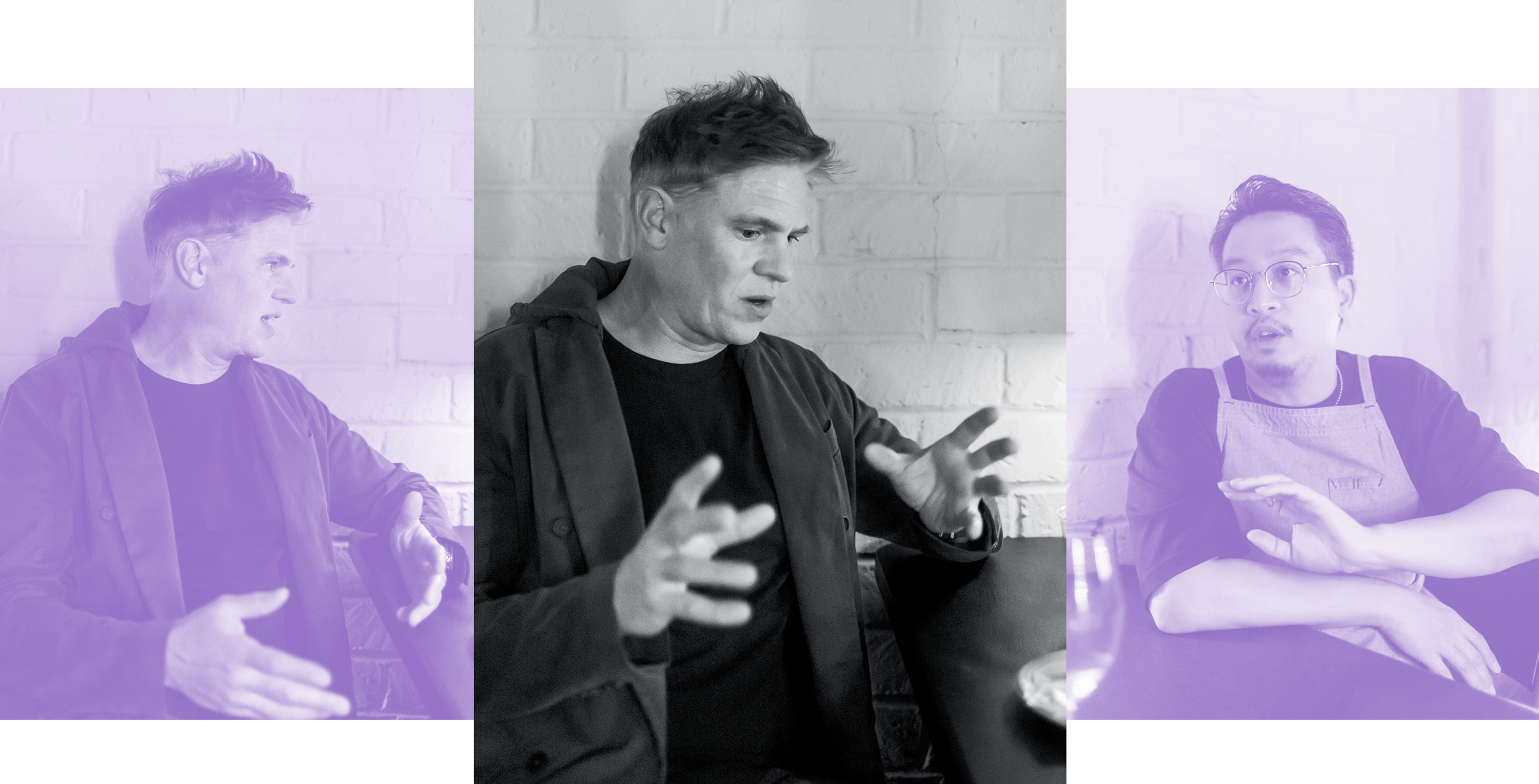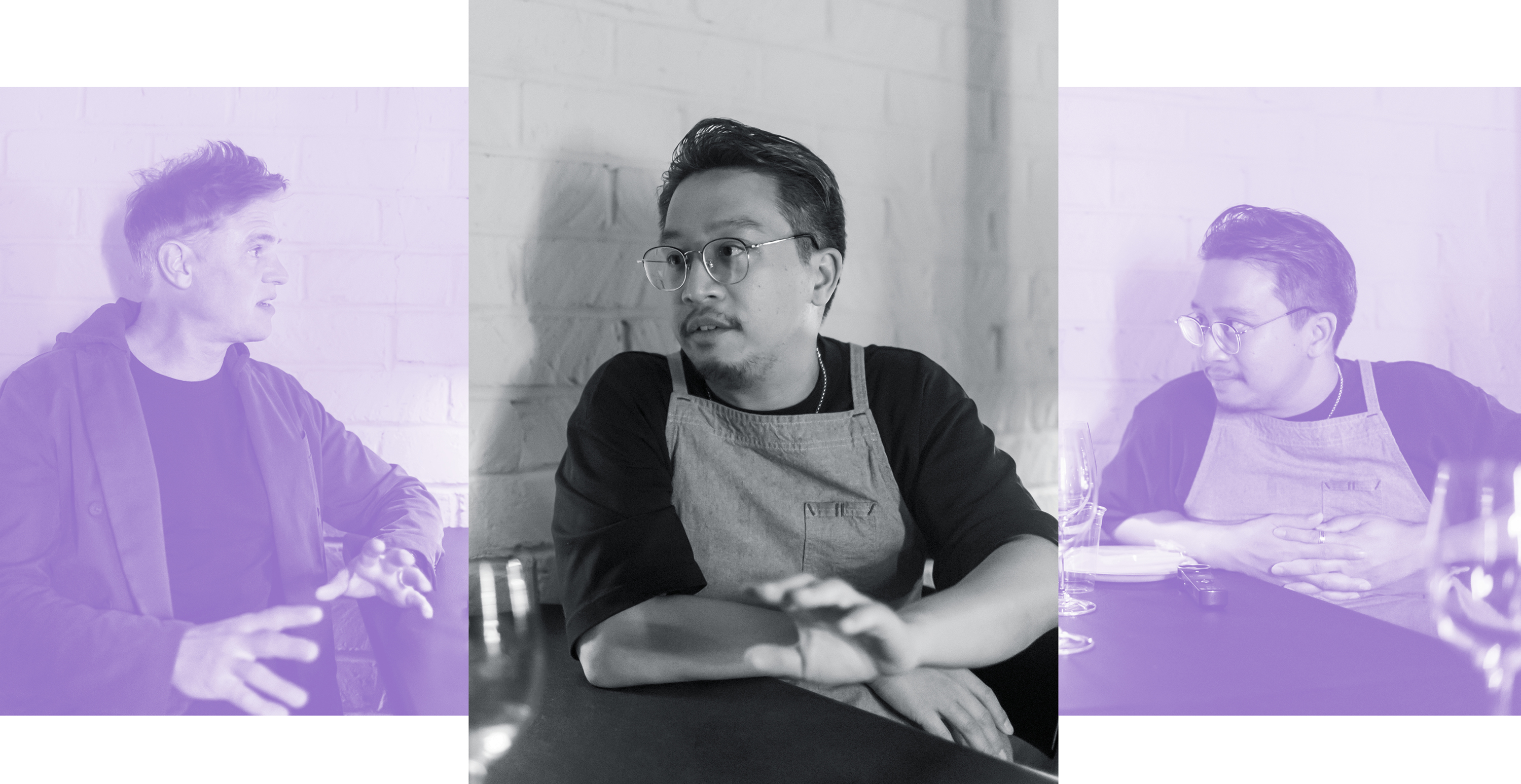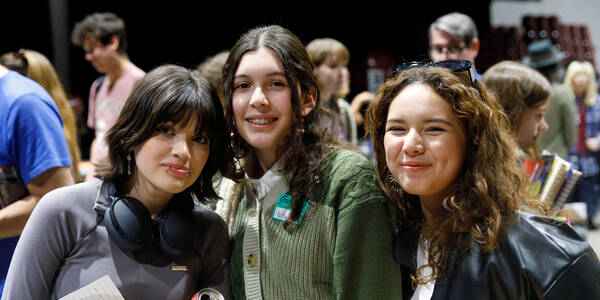Unexpected Landings
Careers don’t always follow a linear path. Just ask Coola founder Chris Birchby and celebrated chef Justin Pichetrungsi, two alums who wound up in places very different from where they’d envisioned themselves.
Sometimes—oftentimes—life throws you a curveball. ArtCenter alumni are not immune to this hard truth. But the curriculum and methodologies taught at the College prepare its graduates to excel in whatever field they may find themselves. Two cases in point: Justin Pichetrungsi (BFA 09 Illustration, MFA 13 Broadcast Cinema) and Chris Birchby (MFA 01 Art).
After graduating, Pichetrungsi became first a concept artist, then art director at The Walt Disney Company, where he worked for nearly 10 years in Interactive and Imagineering. But when his father suffered a stroke in 2019, Pichetrungsi took over the family restaurant, Anajak Thai, in Sherman Oaks. Last year, the prestigious James Beard Award Foundation named Pichetrungsi Best Chef: California; the Los Angeles Times listed Anajak Thai as #2 in its list of Los Angeles’ 101 Best Restaurants; the New York Times included it in America’s Best Restaurants 2022; and it maintains a spot in the Michelin Guide.
Trustee Chris Birchby was trying to make it as a painter in Venice, California, when both his parents were diagnosed with melanoma. Thankfully, they survived. But this turn of events inspired him to dive into the world of organic skincare and sunscreen formulation, eventually leading to his creation of COOLA and, later, its sister company, Bare Republic. In 2019, the family-owned multinational SC Johnson bought a majority stake in COOLA.
On one of Anajak Thai’s boisterous Thai Taco Tuesdays (TTT), evenings when the restaurant serves outdoor diners its famous Southern Thai Fried Chicken along with a bevy of delectable ideations (like Chutoro and Scallop Tostadas!), Birchby and Pichetrungsi met to discuss their varied careers. On was there to capture the conversation.
The following is just a portion of their discussion, edited for brevity.

JUSTIN PICHETRUNGSI: I grew up in a family business, so the realms of family and business were just completely blended. Which, I guess, is why I’m here still. But how hard is it to have both at the same time? I mean, I assume your kids aren’t working in your company that you just sold, so there’s like a level of segregation. You don’t have the blurred line that I have at this restaurant—my aunt works here, my mom does the mango sticky rice...
CHRIS BIRCHBY: I think that’s a wonderful thing. I think that’s the American dream. The dream of a business is creating something successful and making it multigenerational—something where it’s a vehicle to impart morals and values and work ethics. You know, my dad had a law office. I went to work in the law office, as did each one of my three brothers, and the one thing it taught us is ... well, not one of us is a lawyer. (laughs) I’m lucky, because my kids are so young right now—7, 5 and 1—that they missed the years where I was giving it the most and out on the road. I’m so grateful for that. But I’ve worked in a restaurant before, and I know how fiery things can get at times with all the different personalities you manage. It’s one thing in a company setting, where there’s more layers, where you have somebody doing human resources. But a restaurant is fast and loose. How do you manage that with having family here?
PICHETRUNGSI: What we think of when we think of the rowdier parts of a restaurant and a kitchen—some of those tropes are slowly going away. On the West Coast, the East Coast, all over the United States, you are starting to see examples of restaurants turning into responsible operations and businesses with human resources.
BIRCHBY: Do you guys have human resources here?
PICHETRUNGSI: Essentially, yes.
BIRCHBY: How many people do you have here?
PICHETRUNGSI: We have 44 employees, which is a lot. And it’s just to make the thing move every day. That’s always been my goal. I always ask myself, What did I really glean from Disney? And the thing I learned is it’s a responsible company and that many people work there for their entire lives. You can find growth for people and individuals there. And it’s a safe space. Most restaurants are not safe spaces.
BIRCHBY: It’s wonderful that you’re able to bring that structure to your business. I would imagine that things have changed a lot in 25 years. When I worked in a restaurant, it did not feel like a very safe space.
PICHETRUNGSI: Especially an immigrant-run restaurant! So, hopefully, as time goes on, we can have more responsible restaurants. Maybe it can be as responsible as working in a studio. And maybe one day cooks can be paid as much as designers. That doesn’t currently exist.
BIRCHBY: On the creative side, do your family members give you input on the food and the recipes?
PICHETRUNGSI: Have you met my mom yet? (laughs) My mom is the toughest critic. She’s always tasting stuff and saying, “Your dad would do it better” or—oh my God—“Your dad’s is so much better than this.” But what she’s tasting is literally dad’s recipe. But other times I think she’s found solace in the ways the restaurant has changed. ... So, you grew up in a family of four children and now you have three children? Did you always want to have a large family?
BIRCHBY: Yes, and I think it would have been a lot more if we had started earlier. My wife and I would have gone to four or five.
PICHETRUNGSI: There’s still time, my friend. (laughs)
BIRCHBY: The question comes up. Time hasn’t run out yet, but it’s ticking pretty fast. I’m just grateful for what we have and the time we have to spend with each other. I’m grateful for this moment to pause or just slow down. Over the last couple of years, I’ve been able to pull back from some of the day-to-day responsibilities and have more flexibility in my schedule. It’s made all the difference in the world. A lot of those changes for me happened during the COVID lockdown. Like a lot of people, afterward, I didn’t want to go back to such a grueling schedule in the office or on the road, when it’s possible to accomplish so much remotely. But I do like that team aspect and creating in a group. It’s one difference between doing fine art versus design at ArtCenter. I’d hear about team projects and think, Oh, that’s so cool. I didn’t get to experience that.
PICHETRUNGSI: I think that’s because in fine art, you work more in silos. At least in industrial design, we were thrown into groups rather early and forced to work with each other. We were like awkward children working together. Oh God, so awkward! We did that Indy 500 project. Were you there for that? It was a sponsored project with the Indy Racing League, and it was the first time I had ever done one of those. We were in a really stressful team environment, and I just felt like such a failure. It’s burned into my brain. I swore that I would never again go through that painful process of bad communication in a team. And it was the kind of shit that we all probably go through on a daily or hourly basis now, but we’re able to sit through it because we’re mature people. People mature. Companies mature. Restaurants mature. Everything matures.
BIRCHBY: It was definitely very different in the beginning stages of my company. Everything was loose, and it was a lot of fun. Those were some of the best times. The greater concentration of those core memories comes from those earlier days, when I was experiencing new things together with my teammates, and we were in the trenches and fighting the same battles together. We were figuring the same things out and sharing in the wins and the losses. We were learning on the job, and I loved that aspect. I think that’s why when I think about doing something else with a new team, I get really excited again. Experiencing something new together for those first couple of years was the best. You can’t relive or remake the magic of those early years. But I’ve never been really great at the longer-term operating of a business, because it requires so much patience.
PICHETRUNGSI: So your goal was always to sell your company?
BIRCHBY: Yes, because I didn’t think I ever wanted to do anything really long term. I didn’t want to get stuck. When I was at ArtCenter, I couldn’t understand why an artist, why a painter—because painting was really what I was into—seemed like they had to be pigeonholed. It seemed like, as a painter, you make something that’s successful and then you have to replicate that same style for the rest of your career. It drove me crazy. My thesis project was called Infinite Progression, and it was about blending different styles and being more flexible instead of rigid, both in terms of process and materiality or even the thought process behind it. Because the idea of doing the same work over and over seemed like it would get boring. I just couldn’t see how anyone could continue doing that.
PICHETRUNGSI: I feel like that may be an ArtCenter-type gene—being a serial ideator. Ideation is this process, and it’s the only constant. My team always says to me that every day feels like a soft opening.
BIRCHBY: But you’re in that moment right now. That’s amazing. How long have you guys been open?
PICHETRUNGSI: Forty-two years.
BIRCHBY: And how long has this version of it the restaurant been here?
PICHETRUNGSI: I came in four years ago.
BIRCHBY: Do you consider this a new version? Or is it a continuation? How do you parse those two?
PICHETRUNGSI: I feel like it’s all about aging gracefully. I came into this restaurant when it was already my age, so it seems old for a restaurant, but it seems young for a person. There were a lot of things that needed to be maintained. I was taking over a space that had a lot of rusty doorknobs and equipment that needed to be oiled. I think that if you were to give me a title, I’m really the steward of this place, because in order to preserve something, you have to change it. That’s why it looks different, but it’s still my house. I never would have thought that it would one day feel new. None of these people—these young people (laughs and motions around at the crowds dining)—would have come here when my father was the chef.
BIRCHBY: It’s so much about parents and their legacy or what they’re even investing in. I was talking to my brother about investments the other day. My wife and I believe our investment is really our children’s hearts and minds. For my brother and his family, it’s all about experience. They basically have a “Die With Zero” mentality, where they want to live and experience life but bring their children and give them an opportunity to become independent thinkers and individuals. What greater gift can you give someone than the tools they need to have the best chance at a happy life?
PICHETRUNGSI: Okay, here’s a question, and this is a hard one. Would you recommend your kids go to art school?
BIRCHBY: For me, I think there are certain skill sets that if you have them, you can do almost anything. And the ability to tell the story you want to tell is one of the most important skills. Often, what I see is that the best pitch is the one that wins. It doesn’t have to be the best idea, but it’s about the person who can tell the best story. So, for my children, I want them to become experts in learning how to tell the story they want to tell in the most compelling way they can. Because if you can convince people that something is a good idea, you can make things happen.
PICHETRUNGSI: Yeah, as you’re talking, I realize that through the downturns or the upturns of the economy, or through the tools changing the medium and the platforms changing—subscriptions, nonsubscriptions, AI, whatever—the most important thing for a well-rounded creative person to have is the confidence to make something and to be able to sell it from scratch. And being able to direct the experience from a team standpoint and also from a consumer standpoint.
BIRCHBY: That’s a very hard thing: being able to lead a team, but then also being able to pitch it out there and sell it—being an operations person and a salesperson.
PICHETRUNGSI: Yeah. I think if people are going to go to ArtCenter, even more important than the skills is the ability to apply those skills.
BIRCHBY: First and foremost, you’re creative. Then you’re sales, then you’re operations. But to put them all together? That’s where the magic happens. That’s where all the wonderful things start happening.
And here are a few additional gems that were unearthed during the evening:
BIRCHBY ON TEAMWORK: I’ve wished my whole life I could play an instrument and be in a band. When I first started making sunscreen with other people, and we were able to riff off one another, that was the closest I ever felt to being in a band. When you’re in the zone, and you’re jamming together, it’s awesome. I love that aspect of being out of the studio and in the proverbial kitchen.
BIRCHBY ON PAINTING: I was just texting yesterday with a good friend of mine from grad school. He was telling me, “Oh man, you should find the time to paint.” I just recently went through a sale of my company, so really that should free up my time. The goal, even going back to the beginning when I started the whole thing, in my mind I was like, “Okay, I’m going to make a business. I’m going to sell it. And then I’m going to be able to paint on my terms.” And then life happened. And now I have three kids that are 7, 5, and 1. And now I’m starting another company. So, no, I don’t currently paint, but I’m always trying to get back into it.
PICHETRUNGSI ON THE CREATIVE CYCLE: I find that with artists, designers, creatives and entrepreneurs, that there’s just a demon that lives inside of us. And you don’t need a reason to make stuff, it’s just inside you. And that demon will scratch at you until you make the thing. And you’re constantly being poked and prodded to fill this empty hole. And you just go day to day refilling the hole. You start in the morning and say, ‘This is hard. Why did I do this? I’m pretty sure I shouldn’t be doing this. I’m a fake, I’m a fraud.” But after the third cup of coffee, around 2 p.m., you start to feel better about yourself. And then around 6 p.m. you think, ‘Oh, I’m a God! I’m really good at this! This is awesome!” You go to sleep feeling good about the work you’ve done. But there’s still a lot of things to fix. And then the whole day starts over again. It’s a recurring cycle of doubt and insecurity and confidence and security and you toe that line continually your entire life.






